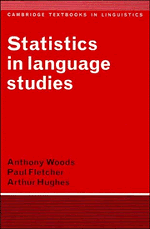Book contents
- Frontmatter
- Contents
- Preface
- 1 Why do linguists need statistics?
- 2 Tables and graphs
- 3 Summary measures
- 4 Statistical inference
- 5 Probability
- 6 Modelling statistical populations
- 7 Estimating from samples
- 8 Testing hypotheses about population values
- 9 Testing the fit of models to data
- 10 Measuring the degree of interdependence between two variables
- 11 Testing for differences between two populations
- 12 Analysis of variance – ANOVA
- 13 Linear regression
- 14 Searching for groups and clusters
- 15 Principal components analysis and factor analysis
- Appendix A Statistical tables
- Appendix B Statistical computation
- Appendix C Answers to some of the exercises
- References
- Index
1 - Why do linguists need statistics?
Published online by Cambridge University Press: 05 June 2012
- Frontmatter
- Contents
- Preface
- 1 Why do linguists need statistics?
- 2 Tables and graphs
- 3 Summary measures
- 4 Statistical inference
- 5 Probability
- 6 Modelling statistical populations
- 7 Estimating from samples
- 8 Testing hypotheses about population values
- 9 Testing the fit of models to data
- 10 Measuring the degree of interdependence between two variables
- 11 Testing for differences between two populations
- 12 Analysis of variance – ANOVA
- 13 Linear regression
- 14 Searching for groups and clusters
- 15 Principal components analysis and factor analysis
- Appendix A Statistical tables
- Appendix B Statistical computation
- Appendix C Answers to some of the exercises
- References
- Index
Summary
Linguists may wonder why they need statistics. The dominant theoretical framework in the field, that of generative grammar, has as its primary data-source judgements about the well-formedness of sentences. These judgements usually come from linguists themselves, are either–or decisions, and relate to the language ability of an ideal native speaker in a homogeneous speech community. The data simply do not call for, or lend themselves to, the assignment of numerical values which need to be summarised or from which inferences may be drawn. There appears to be no place here for statistics.
Generative grammar, however, despite its great contribution to linguistic knowledge over the past 25 years, is not the sole topic of linguistic study. There are other areas of the subject where the observed data positively demand statistical treatment. In this book we will scrutinise studies from a number of these areas and show, we hope, the necessity for statistics in each. In this brief introduction we will use a few of these studies to illustrate the major issues with which we shall be faced.
As we will demonstrate throughout the book, statistics allows us to summarise complex numerical data and then, if desired, to draw inferences from them. Indeed, a distinction is sometimes made between descriptive statistics on the one hand and inferential statistics on the other. The need to summarise and infer comes from the fact that there is variation in the numerical values associated with the data (i.e. the values over a set of measurements are not identical). If there were no variation, there would be no need for statistics.
- Type
- Chapter
- Information
- Statistics in Language Studies , pp. 1 - 7Publisher: Cambridge University PressPrint publication year: 1986

